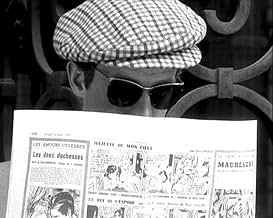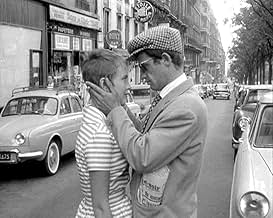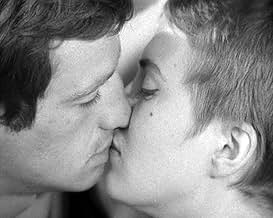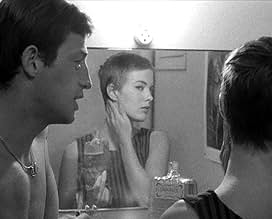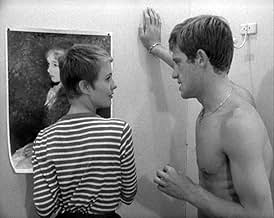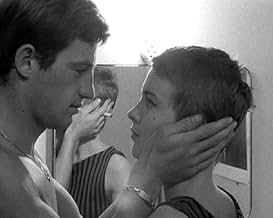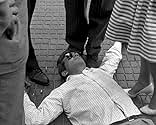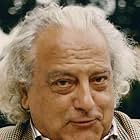A small-time crook, hunted by the authorities for a car theft and the murder of a police officer, attempts to persuade a hip American journalism student to run away with him to Italy.A small-time crook, hunted by the authorities for a car theft and the murder of a police officer, attempts to persuade a hip American journalism student to run away with him to Italy.A small-time crook, hunted by the authorities for a car theft and the murder of a police officer, attempts to persuade a hip American journalism student to run away with him to Italy.
- Nominated for 1 BAFTA Award
- 5 wins & 4 nominations total
Richard Balducci
- Tolmatchoff
- (uncredited)
Daniel Boulanger
- Police Inspector Vital
- (uncredited)
Gérard Brach
- Photographer
- (uncredited)
Philippe de Broca
- A Journalist
- (uncredited)
José Bénazéraf
- Man in a White Car
- (uncredited)
Jean Domarchi
- A Drunk
- (uncredited)
Jean Douchet
- A Journalist
- (uncredited)
Liliane Dreyfus
- Liliane
- (uncredited)
- …
Michel Fabre
- Police Inspector #2
- (uncredited)
Roger Hanin
- Carl Zubart
- (uncredited)
Henri-Jacques Huet
- Antonio Berrutti
- (uncredited)
Raymond Huntley
- A Journalist
- (uncredited)
André S. Labarthe
- Journalist at Orly
- (uncredited)
- Director
- Writers
- All cast & crew
- Production, box office & more at IMDbPro
Storyline
Did you know
- TriviaDespite reports to the contrary, Jean-Luc Godard did not shoot the film without a script; however, he did not have a finished script at the beginning, instead writing scenes in the morning and filming them that day. See also Pierrot le fou (1965).
- GoofsDuring street shots, countless passersby look at Patricia and Michel and stare into the camera, revealing that the shots were made without filming barriers and simply used street pedestrians in place of extras.
- Quotes
Patricia Franchini: What is your greatest ambition in life?
Parvulesco: To become immortal... and then die.
- ConnectionsEdited into Pariz pripada nama! (2016)
Featured review
Watching Jean-Luc Godard's massively influential, unintentional-classic Breathless and discussing Jean-Luc Godard's massively influential, unintentional-classic Breathless are two totally different things. For one, the latter is more fun the other and, two, discussing the film almost instantly allows for quality, intelligent discussion of cinema to ring. There are certain cinephiles that take Godard himself more seriously than they take any other director who has ever lived. Just when you thought Stanley Kubrick-fanatical elitism was out of control, spend about ten minutes, as an exercise, scouring the internet for French New Wave forums and in-depth analysis of the Godardian methods and you may be surprised at what you find.
I'm only stating this because around a year and a half ago, I began my sporadic voyage into the depths of Godard with his most recent picture, at the time, Film Socialisme, which I found to be an assault on every conceivable sense and not in a particularly good way. The film was choppy, disjointed, messy, just about as incomprehensible as it could be, and trying to find justifications or analyses online proved ineffective. All and all, it's a film I just want to forget and I didn't care to dive into Godard much after that endeavor. I now realize that a decent part of the blame is on me for choosing perhaps the wrong film to begin my Godardian journey with. I emerge from seeing Breathless (known by its French title as À bout de soufflé) with a more of a positive reaction. This is a bravely-structured and maturely handled annihilation to every cinematic convention prior to its 1960 release down with class and impenetrable style on part of Godard.
The story - even though it is relatively the least of our concerns - follows Michel (Jean-Paul Belmondo), who is trying to emulate the characteristics possessed by Humphrey Bogart during the particular 40s/50s era of menacing American crime dramas that billed him as the lead actor. One day, feeling intimidated and a perhaps a little adventurous, Michel shoots a police officer who has been tailing him and now must deal with being broke and on the run from the cops. His only companion is Patricia (Jean Seberg), an American journalist getting by in life by selling newspapers in downtown Paris. The two desperately skim through their options trying to hide from the police, one of which is skipping town and going all the way to Italy as fugitives.
I say the story is the least of our concerns because there is simply not much to it. After all, Breathless is an aesthetic breakthrough rather than a narrative one. Godard employs dangerously subversive jump cuts - where the camera cuts to another shot within the same frame creating a breach in continuity - along with rapid-fire, quick shots and lengthy dialog scenes. All of this broke French cinema convention, which, prior to this, was consistently polished and very elegant. Godard invited in a rebellious messiness to the picture, almost like the guy coming into a neatly-organized room and rustling all the papers and files to not only create a stir but to do something different, something completely new.
It's almost shortchanging to simply say that I have immense respect for Godard seeing as in 1960, a time when social change and civil unrest amongst adolescents and twentysomethings seemed to be so prevalent in many different places, he ushered in a new way of doing things cinematically and created a stylistically bold film because of it. He even threw in the element of using a hand-held camera, an unheard of practice during this particular time. I think I would also be in line to compare Breathless to Bonnie and Clyde, a film that would enter the picture seven years later in American studios that would simultaneous shock and stimulate audiences everywhere.
Godard's films have a unique power after you watch them. For example, it has been about four days since I sat down to watch Breathless and since watching it - and now writing a medium-length analysis of it - I have a strong, biting urge to watch more of Godard's films. His films have the kind of impact where you just want to talk about them and talk about their impact in great length; which, once more, brings me to the point that watching the films is actually the weaker part compared to discussing them.
Starring: Jean-Paul Belmondo and Jean Seberg. Directed by: Jean-Luc Godard.
I'm only stating this because around a year and a half ago, I began my sporadic voyage into the depths of Godard with his most recent picture, at the time, Film Socialisme, which I found to be an assault on every conceivable sense and not in a particularly good way. The film was choppy, disjointed, messy, just about as incomprehensible as it could be, and trying to find justifications or analyses online proved ineffective. All and all, it's a film I just want to forget and I didn't care to dive into Godard much after that endeavor. I now realize that a decent part of the blame is on me for choosing perhaps the wrong film to begin my Godardian journey with. I emerge from seeing Breathless (known by its French title as À bout de soufflé) with a more of a positive reaction. This is a bravely-structured and maturely handled annihilation to every cinematic convention prior to its 1960 release down with class and impenetrable style on part of Godard.
The story - even though it is relatively the least of our concerns - follows Michel (Jean-Paul Belmondo), who is trying to emulate the characteristics possessed by Humphrey Bogart during the particular 40s/50s era of menacing American crime dramas that billed him as the lead actor. One day, feeling intimidated and a perhaps a little adventurous, Michel shoots a police officer who has been tailing him and now must deal with being broke and on the run from the cops. His only companion is Patricia (Jean Seberg), an American journalist getting by in life by selling newspapers in downtown Paris. The two desperately skim through their options trying to hide from the police, one of which is skipping town and going all the way to Italy as fugitives.
I say the story is the least of our concerns because there is simply not much to it. After all, Breathless is an aesthetic breakthrough rather than a narrative one. Godard employs dangerously subversive jump cuts - where the camera cuts to another shot within the same frame creating a breach in continuity - along with rapid-fire, quick shots and lengthy dialog scenes. All of this broke French cinema convention, which, prior to this, was consistently polished and very elegant. Godard invited in a rebellious messiness to the picture, almost like the guy coming into a neatly-organized room and rustling all the papers and files to not only create a stir but to do something different, something completely new.
It's almost shortchanging to simply say that I have immense respect for Godard seeing as in 1960, a time when social change and civil unrest amongst adolescents and twentysomethings seemed to be so prevalent in many different places, he ushered in a new way of doing things cinematically and created a stylistically bold film because of it. He even threw in the element of using a hand-held camera, an unheard of practice during this particular time. I think I would also be in line to compare Breathless to Bonnie and Clyde, a film that would enter the picture seven years later in American studios that would simultaneous shock and stimulate audiences everywhere.
Godard's films have a unique power after you watch them. For example, it has been about four days since I sat down to watch Breathless and since watching it - and now writing a medium-length analysis of it - I have a strong, biting urge to watch more of Godard's films. His films have the kind of impact where you just want to talk about them and talk about their impact in great length; which, once more, brings me to the point that watching the films is actually the weaker part compared to discussing them.
Starring: Jean-Paul Belmondo and Jean Seberg. Directed by: Jean-Luc Godard.
- StevePulaski
- Jan 21, 2014
- Permalink
Details
- Release date
- Country of origin
- Languages
- Also known as
- Ausser Atem
- Filming locations
- 11 rue Campagne Première, Paris 14, Paris, France(on location)
- Production companies
- See more company credits at IMDbPro
Box office
- Budget
- FRF 400,000 (estimated)
- Gross US & Canada
- $414,173
- Opening weekend US & Canada
- $32,424
- May 30, 2010
- Gross worldwide
- $594,039
- Runtime1 hour 30 minutes
- Sound mix
- Aspect ratio
- 1.37 : 1
Contribute to this page
Suggest an edit or add missing content






